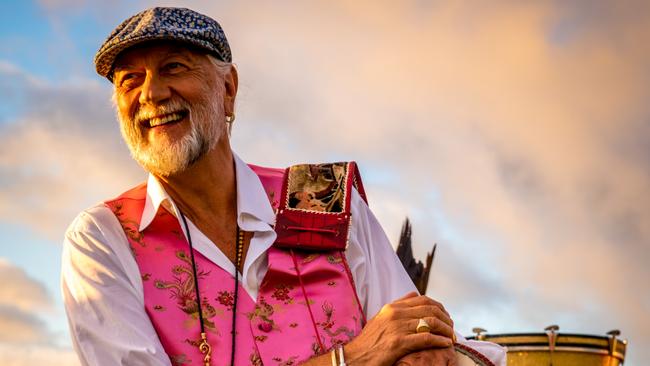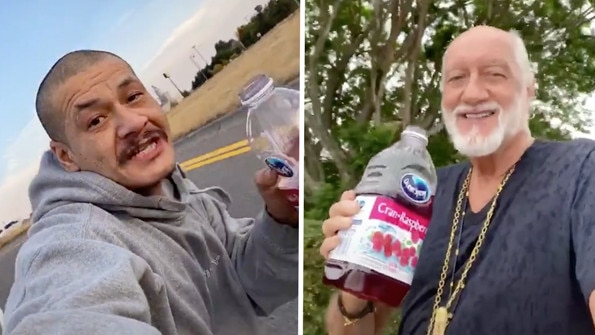How the Fleetwood Mac song Dreams became a TikTok hit
Four decades after it was a No 1 hit in the US, one of the band’s signature songs is being streamed by millions and has lured Mick Fleetwood and Stevie Nicks onto TikTok.

On a Friday morning in late September, Nathan Apodaca filmed himself riding a skateboard to work at a potato warehouse while sipping from a bottle of cranberry juice and listening to Dreams, the classic Fleetwood Mac song that was released in 1977.
After letting the opening lyrics pass by, he looked directly into the camera and gave a sudden, gleeful lip-synched performance to the third line sung by Stevie Nicks: “It’s only right that you should play the way you feel it …”
And then he posted the video to TikTok, the platform whose preponderance of lip-synched performances and competitive dance-offs to pop songs of yesterday and today have made the social media app such a hit with younger generations.
From start to finish, his clip ran for 25 seconds. It was captured in a single shot; there was no second take. The skateboarder posted it to his account, @420doggface208, and simply got on with his day — which wasn’t going particularly well. He was riding on the pavement rather than driving on the highway because his car battery had failed, yet when life handed him lemons, Apodaca shrugged and made lemonade.
I don’t use this verbiage often but this is a whole vibe. simple as that pic.twitter.com/NfdLsgLkxu
— DrewFrog (@DrewFrogger) September 25, 2020
Wearing a grey hoodie, a shaved head and a prominent scalp tattoo, the 37 year-old Idaho resident did not look much like the typical baby boomer you might find yourself sitting beside at a Fleetwood Mac concert, yet the sheer joy on display as he sang those few words from a universally loved song struck a chord. As a simple slice-of-life moment, its appeal was irresistible: no matter your mood before seeing the video, it was certainly brightened afterwards.

Within days, the video had gone viral, not just on TikTok — where Apodaca’s original clip now has 45 million views — but in cross-platform copies including Twitter, where the official account for Fleetwood Mac retweeted it on September 27 accompanied by a resounding endorsement: “We love this!”
The story took its first unexpected turn a week later, on October 5, when Mick Fleetwood — the British-American band’s white-haired 73-year-old drummer and founding member — created a TikTok account purely to pay tribute to Apodaca, by filming himself rolling down a garden path, sipping from the same brand of cranberry juice and earnestly lip-synching the same Stevie Nicks line, before signing off with a huge grin.
Classic MF#Dreams #CranberryDreams #MickFleetwood https://t.co/QXkvvaWuGR
— Fleetwood Mac (@fleetwoodmac) October 4, 2020
The video spawned thousands of copy cats and a #cranberrydreams challenge. Last week, the juice company Ocean Spray gifted Apodaca with a new “cranberry red” truck, while thanking him for exposing their cran-raspberry juice to millions of eyeballs worldwide.
Then on Thursday Stevie Nicks herself joined in the fun by posting her own video, sending fans into raptures as she laced a pair of rollerskates with the caption: “Afternoon vibe. Lace ‘em up!”
Afternoon vibe. Lace 'em up! #Dreams #FleetwoodMac #CranberryDreams @420dogface208 https://t.co/eg5f54bu0b pic.twitter.com/Mj1clEpnas
— Stevie Nicks (@StevieNicks) October 13, 2020
Released as the second single from Fleetwood Mac’s 1977 album Rumours, Dreams reached No 1 in the US and Canada and became one of its biggest hits. It's opening lines are
In recent weeks Billboard magazine reports that the track has received more than eight million streams in the US alone. Here in Australia, Dreams jumped 25 spots to sit at No 14 in this week’s ARIA singles chart, wedged between new releases from much younger hip-hop and pop acts such as Shawn Mendes, Pop Smoke and The Weeknd.
Not bad for a 43-year-old song.
Last week, BBC World News America surprised Apodaca by linking him with Mick Fleetwood live on air. “We owe you,” said the British drummer with a grin. “It’s such a celebration of everything; it’s so joyous and fun.”
After noting that his children had encouraged him to respond to the cranberry-flavoured tribute via TikTok, Fleetwood told Apodaca, “It’s such a great story, and so needed in days that are really challenging.
“I’ve heard you speaking, and it makes people smile. I’m so happy to be part of it. Congratulations on a wild, wild skateboard journey that has led us to talking today. It is truly my pleasure.”
Taken together, the call-and-response exchange of Apodaca’s post with the one from Mick Fleetwood represents online culture at its very best. The purity and lightness of tone evoked message boards and chat rooms circa 2000, where relatively early adopters of new technology were still figuring out how to interact with other individuals elsewhere on the planet, often anonymously. Goodwill was abundant, trolling was in its infancy, and there was a sense that the internet offered a window of possibility onto a utopian extension of society.

By and large, that has turned out not to be true: anyone who chooses to spend even a few minutes per day on social media will know that it can sometimes feel akin to stepping through a minefield where it can be hard to discern useful signal through the noise of complaint, toxicity, trolling, bullying and armies of bots enlisted to further political agendas while angrily shouting down anyone with a conflicting view.
This year, nobody has escaped the COVID-19 pandemic, whose effects on individuals have ranged from unemployment to depression to death. With national and state-based lockdowns interrupting the usual machinery of life, many of us have been forced to turn inward to the home, if only temporarily — a shift that has often been accompanied by more screen time.
Positivity has been in short supply, and perhaps this is why Apodaca’s video spread so quickly: here was a momentary, much-needed tonic whose sole purpose of existence was to put a smile on your face. The same went for Fleetwood’s reply, which cheerfully mimicked the original by sharing the same purity of intent.





To join the conversation, please log in. Don't have an account? Register
Join the conversation, you are commenting as Logout